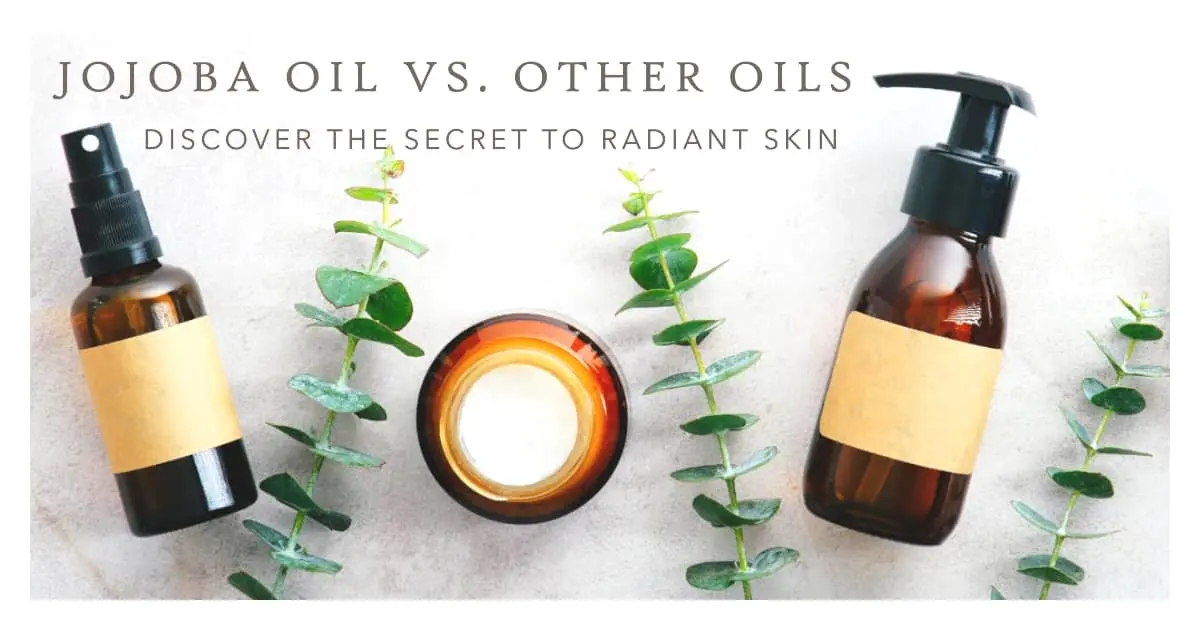Castor oil has become a popular natural remedy and is known for its many benefits for hair, skin, and overall health. But when you go to buy castor oil, you’ll likely come across two main varieties such as traditional generic castor oil, and Jamaican black castor oil (JBCO). So what’s the difference, and is one better than the other?
In this comprehensive guide, we’ll explain everything you need to know about JBCO and regular castor oil, including how they differ, their benefits, uses, safety considerations, and whether one variety is superior. Read on to become a castor oil expert!
Table of Contents
What is Castor Oil?

Castor oil comes from the seeds of the Ricinus communis plant, commonly known as the castor bean or castor oil plant. Native to tropical areas of Africa and Asia, the castor plant can grow as tall as 15-40 feet in the right climate!
To produce castor oil, the seeds are first cold-pressed to extract the oil. The cold-pressing keeps the oil in its purest form. Castor oil has a unique chemical composition. It contains ricinoleic acid, a type of unsaturated omega-9 fatty acid not commonly found in plant oils. In fact, castor oil has a ricinoleic acid content of around 90%, much higher than most other seed oils. This fatty acid content gives castor oil its healing, moisturizing, and other medicinal properties.
Now that we’ve covered some castor oil basics, let’s move on to the differences between traditional and Jamaican black castor oil.
JBCO vs Regular Castor Oil: Key Differences
While both originated from the castor plant, JBCO, and regular castor oil have some notable differences:
Origin: As the name suggests, Jamaican black castor oil comes from Jamaica, where castor beans have been roasted, boiled, and processed for years. Regular castor oil is generic and can come from castor beans grown and processed anywhere.
Processing Method: One of the biggest differences lies in how the oils are processed after harvesting the beans. To make JBCO, the castor beans are first roasted, then boiled, and finally hand-pressed to extract the oil. Roasting and boiling the beans increases the ash content in JBCO, which is responsible for its darker color.
Regular castor oil skips the roasting step and is instead cold-pressed directly after harvesting. Avoiding heat helps preserve the structural integrity of the oil’s compounds.
Color: Due to the extra roasting and boiling involved, JBCO is black in color rather than the pale yellow of traditional castor oil.
Composition: The processing methods also influence the composition of the two oils. It is suggested that JBCO contains more ricinoleic acid than regular castor oil. This variance in ricinoleic acid may make JBCO more easily absorbed and provide enhanced benefits when applied topically.
Now that we’ve seen how JBCO and regular castor oil differ, let’s analyze how these differences impact their benefits and uses.
Comparison of Benefits and Uses
Both varieties of castor oil offer a multitude of benefits, especially when it comes to hair, skin, and occasional internal use. Let’s take a closer look at how JBCO and regular castor oil stack up:
Hair Health

One of the most popular uses of both JBCO and regular castor oil is for improving hair health. The ricinoleic acid provides moisturizing fatty acids to nourish hair and scalp. Here’s a comparison of how the two oils perform for common hair concerns:
Growth: The extra ash content in JBCO makes it slightly better than regular castor oil when it comes to stimulating new hair growth. The minerals in the ash nourish follicles.
Moisture: Both varieties excel at hydrating and locking in moisture due to their ricinoleic acid content. JBCO has a slight edge, as roasting makes its compounds easier to absorb into the hair.
Reduced Breakage: Applying either oil can coat strands in a protective layer to prevent breakage and shedding. JBCO may perform marginally better due to higher fatty acid absorption.
Overall, JBCO appears to have a slight advantage over regular castor oil when it comes to hair care including eyebrows. But both oils still perform well, providing fatty acids and hydration to strengthen, grow, and smooth hair.
Skin Care

Castor oil also offers extensive benefits when applied to the skin. It excels at moisturizing, healing, and rejuvenating skin tissue thanks to its anti-inflammatory and antimicrobial properties. Here’s how the oils compare for skin:
Moisturizing: The ricinoleic acid in both oils is readily absorbed into the skin to provide deep hydration. JBCO has higher skin absorption rates for enhanced moisturizing effects.
Healing Acne Scars: Applying, either castor oil can accelerate the healing of acne, scars, and spots due to ricinoleic acid’s ability to penetrate the skin and stimulate tissue repair. JBCO is slightly more effective.
Anti Aging: Castor oil has antioxidant properties that fight free radicals to reduce signs of aging like wrinkles and uneven tone. JBCO wins again in this category.
Overall for skincare, JBCO seems to outperform regular castor oil, likely due to its higher absorption rates. But both oils are excellent emollients that can rejuvenate dull, dry skin.
Other Uses
Castor oil has a number of other niche uses outside of hair and skincare as well. Here are a few ways both oils can be used:
- Nail care: Moisturize and strengthen brittle nails
- Massage oil: Lubricate and relax muscles
- Laxative: Taken orally to stimulate bowel movements
For these miscellaneous uses, JBCO and regular castor oil are typically comparable in effects. The choice comes down to personal preference.
Safety and Precautions

When used properly, castor oil is generally considered safe with a low risk of side effects. However, some general precautions apply when using either JBCO or regular castor oil:
- Allergies: Discontinue use if any irritation or reactions develop. Do a patch test first.
- Side Effects: Oral castor oil may cause nausea, cramps, or diarrhea in some individuals.
- Pregnancy: Speak to your doctor before use while pregnant or breastfeeding.
- Eye Contact: Avoid getting castor oil in the eyes as it can cause irritation. Flush eyes thoroughly with water if contact occurs.
Perform Patch Test
You can perform a simple patch test before wider use to check for potential allergic reactions:
- Apply a small amount of the oil to your inner arm.
- Cover with a bandage and leave it for 24-48 hours.
- If no redness or itching develops, the oil should be safe to use.
Finally, Which Oil is Better?
With the wealth of information we’ve covered, which variety of castor oil reigns supreme?
In many cases, Jamaican black castor oil has a slight performance edge and enhanced absorption. The roasting process increases its ash content, which gives JBCO higher levels of minerals and makes the compounds easier to absorb into hair, skin, and nails.
However, regular cold-pressed castor oil still provides abundant benefits. The cold-pressing retains more of the oil’s natural color, scent, and nutritional content. If you have very dry or damaged hair or skin, JBCO may be the better choice. But regular castor oil still excels at delivering moisturizing fatty acids.
Ultimately, the variety you choose depends on the specific benefits you’re looking for. Both oils are extremely versatile for hair and skin care. Jamaican black castor oil may work a bit better if you really want to boost growth or healing. But in many cases, the oils are almost interchangeable.
Highlights of JBCO vs Regular Castor Oil
| Difference | JBCO | Regular Castor Oil |
|---|---|---|
| Origin | Jamaica | Generic, various origins |
| Processing Method | Roasted and boiled | Cold-pressed only |
| Color | Black | Pale yellow |
| Composition | Higher ricinoleic acid content (approx. 4-5% more) | Lower ricinoleic acid |
| Absorption | Higher absorption rates due to roasting | Lower absorption rates |
| Hair benefits | Slightly better for growth, moisture, and breakage | Good for hair but slightly lower performance |
| Skin benefits | Better for moisturizing, healing, and anti-aging | Good for skin but slightly lower performance |
| Other uses | Comparable effects | Comparable effects |
Where to Buy Castor Oil
When purchasing castor oil, always look for 100% pure, cold-pressed oil. You want the highest quality oil from reputable brands. Some places you can buy castor oil include:
- Natural health stores: Purchase JBCO or regular castor oil in person to inspect quality.
- Online retailers: Order from Amazon, Vitacost, iHerb, or directly from brand websites.
- Drugstores: Find smaller bottles of castor oil for topical use in the beauty/cosmetics section.
High-quality castor oil doesn’t need to be expensive. Just be sure to inspect labels closely and avoid low-grade oils, which won’t provide the same results.
Takeaway
To wrap it all up, while Jamaican black castor oil and regular castor oil originate from the same plant source, their production methods differ greatly. JBCO involves roasting and boiling the castor beans, which enhances the ash content. Regular castor oil uses cold-pressing only.
These variations in processing lead to differences in composition and color. But both oils still contain abundant ricinoleic acid to deliver benefits when applied topically or occasionally ingested.
When evaluating JBCO vs regular castor oil, JBCO tends to have slightly enhanced absorption and potency. But both oils excel at hydrating, repairing, and rejuvenating hair and skin. Ultimately, the choice between the two oils depends on your specific needs and preferences.
We hope this complete guide to Jamaican black castor oil and regular castor oil assists you in selecting the ideal option for your hair care, skin care, and health goals. Feel empowered to harness the benefits of nature’s miraculous castor oil plant!
7 Sources:
Noble Home Remedies relies on peer-reviewed studies, academic research institutions, and medical associations for accuracy and reliability while avoiding tertiary references. Our editorial policy provides more information about how we ensure our content is accurate and up-to-date.
- Castor-oil plant
https://www.britannica.com/plant/castor-oil-plant - Jamaican Black Castor Oil VS Castor Oil: Which is Better?
https://castoroil-guide.com/jamaican-black-castor-oil-vs-castor-oil/ - Benefits of castor oil for the face and skin
https://www.medicalnewstoday.com/articles/319844 - The Hype of Jamaican Black Castor Oil (JBCO)
https://www.byrdie.com/the-hype-on-jamaican-black-castor-oil-jbco-400384 - Jamaican Black Castor Oil
https://www.castoroil.co.uk/types-of-castor-oil/jamaican-black-castor-oil-jbco.html - Bioactive-Based Cosmeceuticals: An Update on Emerging Trends
https://www.ncbi.nlm.nih.gov/pmc/articles/PMC8837976/ - Laxative (Oral Route)
https://www.ncbi.nlm.nih.gov/pmc/articles/PMC8837976/






